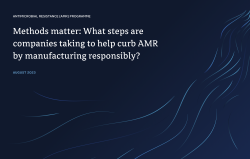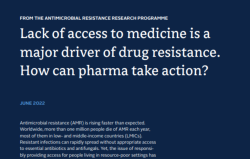How have companies responded to their AMR Benchmark Opportunities?
Date
21 November 2023
For Opportunities related to access, some progress can be seen – especially in expanding product registration and engaging in long-term initiatives to boost availability and affordability.
Despite a handful of acquisitions to expand R&D pipelines, R&D projects targeting priority pathogens and urgent AMR threats are still lacking.
Some positive examples of progress on Opportunities to limit AMR risk from manufacturing, yet minimal movement to increase public disclosure.
No progress on Opportunities to delink bonuses from sales volume; some progress on improving surveillance disclosure and mitigating conflicts of interest.
Research & Development
Few companies show progress on expanding R&D pipeline
With the current arsenal of antibiotics and antifungals losing its effectiveness due to AMR, new treatments are drastically needed. Five companies were presented with Opportunities that highlighted how they could expand the breadth of their pipelines to include more antimicrobial R&D projects targeting priority pathogens and urgent AMR threats. So far, two companies – Pfizer and Shionogi – have demonstrated progress, while Novartis, Otsuka and Sanofi have not. Both companies that demonstrated progress have added projects to their pipelines via acquisitions or strategic partnerships.
Given that small- and medium-sized enterprises (SMEs) struggle to survive the financial ‘valleys of death’ of the drug development process while carrying out 75% of antibacterial and antifungal R&D, acquisitions like those undertaken by Pfizer and Shionogi play a pivotal role in sustaining innovation and ensuring global access to these crucial developments.
Pfizer, through an acquisition, added SPR206 to its pipeline and progressed three existing candidates to later stages of development. SPR206, an investigational intravenously (IV)-administered polymyxin product candidate, is ready to enter Phase II and targets multidrug-resistant (MDR) gram-negative bacterial infections. MDR gram-negative bacterial infections, such as pneumonia, meningitis, bloodstream infections, and surgical site infections, are predominantly found in hospitals, and are resistant to multiple antibiotics. Developing products that can target these infections effectively will protect patients.
Shionogi expanded its pipeline by adding, through a strategic partnership, a novel oral antifungal therapy in Phase III to treat invasive aspergillosis and by acquiring two combination products in Phase I that target pathogens including carbapenem-resistant A. baumannii, P. aeruginosa, and Enterbacterales. These products, designed for both oral and IV administration, are based on xeruborbactam, a novel boronic acid ß-lactamase inhibitor. When antibiotics are developed solely as an IV treatment, patients need to visit a hospital for administration of the medicine. By developing both an oral and an IV formulation in parallel, patients could potentially spend less time receiving treatment at a hospital; reduced bed occupancy could, in turn, also alleviate pressure on hospitals.
Responsible Manufacturing
More companies are integrating AMR risk into their environmental risk strategies
When manufacturing lifesaving antibiotics, it is critical that AMR does not become an unintended side effect – which is why companies must manage their antibiotic waste responsibly. In 2021, five out of the 17 companies in scope – Alkem, Fresenius Kabi, Hainan Hailing, Otsuka and Sun Pharma – did not specify any strategy to limit AMR risk through responsible manufacturing. Since then, four of these companies have reported some progress, with the exception of Hainan Hailing, which has not demonstrated any significant progress in this area.
Fresenius Kabi reports that it is in the process of fully implementing the manufacturing standards of the AMR Industry Alliance and reports that approximately one-third of all its own sites and half of its assessed suppliers now comply with discharge limits in the receiving environment. The AMR Industry Alliance is a coalition of companies and associations that aims to drive progress on AMR. In the absence of independent regulation targeting the AMR risk from antibiotic manufacturing, the Antibiotic Manufacturing Standard facilitated by BSI Standards Limited.
Otsuka has developed an analytical method to quantify the levels of delamanid, its sole product in scope of the AMR Benchmark, and has plans to measure discharge levels. While Sun Pharma and Alkem do not report on environmental risk-management strategies covering AMR, Alkem has publicly reported that it has implemented Zero Liquid Discharge (ZLD) – a treatment process in which the site does not discharge any water into the environment – across 64% of its manufacturing sites. Sun Pharma reports the use of ZLD systems at all 12 of its manufacturing sites.
These developments indicate a growing awareness and commitment among these companies to integrate responsible manufacturing practices that address AMR risk into their broader environmental strategies.
In 2023, the Foundation published a report zeroing in on responsible manufacturing practices. It identifies examples of how some companies are developing and maintaining solutions that will help them limit their antibiotic waste more effectively. This report, which includes specific recommendations, can help guide companies to make further progress on their Opportunities.

What steps are companies taking to help curb AMR by manufacturing responsibly?
Read moreLimited reporting on supplier compliance with discharge limits
While several companies show progress in their efforts to collaborate with suppliers to reduce AMR risk, only a few have disclosed the extent to which their suppliers adhere to discharge limits from antibiotic waste.
Pfizer reports that 86% of its 100-plus supplier sites are now compliant with discharge limits in the receiving environment (e.g., rivers and waterways). Similarly, Shionogi reports that 71% of its supplier sites are compliant, up from 33% in 2021.
Companies’ submissions for this report outline the challenges associated with improving compliance among their suppliers, as there is currently no specific regulation stipulating permitted antibiotic waste release levels into the environment. If wastewater containing high levels of active pharmaceutical ingredients (APIs) is released into the environment, it poses a serious risk to human health, while also causing environmental harm.
While contractual provisions offer a solution, enforcing such contracts can be difficult, often due to limited alternative supplier options. Consequently, companies are taking proactive measures to support and assist their suppliers in addressing compliance challenges. For instance, Abbott supports suppliers by providing free wastewater analysis and logistics assistance.
Public disclosure on managing antibiotic waste keeps falling short
Out of 17 companies, 16 were presented with the Opportunity to increase public disclosure on their AMR-focused manufacturing approaches. However, to date, none of the companies have disclosed audit results or antibacterial discharge levels of their own sites or those of their suppliers. The one example of progress comes from Viatris, which now publicly discloses that all its own manufacturing sites comply with certain discharge limits set by the AMR Industry Alliance.
Appropriate Access
Expanded registration of essential off-patent and/or generic medicines
To save patients’ lives and curb AMR, it is crucial that every patient has access to the right antibiotic or antifungal medicine at the right time. An important element of this is for companies to ensure that their older, off-patent and/or generic products are widely registered with national regulatory authorities, including in low- and middle-income countries (LMICs). Of the nine companies given the Opportunity to expand registration of such products, six – Abbott, Aurobindo, Cipla, Sanofi, Teva and Viatris – have made progress, to varying degrees. Viatris, for instance, filed six products listed on the 2023 WHO Model List of Essential Medicines (EML) in an average of two additional LMICs in scope. Teva reports that it has filed five of its essential medicines for registration in at least one additional LMIC.
The 2023 WHO EML presents essential medicines that should be available to every healthcare system. Of these medicines, 90% are already off-patent, offering huge potential for generic medicine manufacturers to expand access. In 2023, a first-of-its-kind report from the Foundation examined what five of the world’s largest generic and biosimilar medicine manufacturers are doing to expand access to essential medicines – and provides tailored Opportunities for each company to bolster efforts.
Nonetheless, several companies expressed market viability concerns as a barrier to expand registration filings in LMICs. This includes tenders that predominantly take prices into account and not quality or environmental aspects. In addition, for in-licensed products, expanding registration can be constrained by contractual terms with licensors. Based on companies’ submissions for this report, broader medicine registration in LMICs could be facilitated by clarity about demand, harmonised registration procedures and non-price tender criteria.
In a report published in 2022, the Foundation set out a wide range of strategies that are available to companies for overcoming such barriers and improving access appropriately and sustainably. The report includes six case studies showing what companies and their partners are already doing to expand appropriate access.

Lack of access to medicine is a major driver of drug resistance. How can pharma take action?
Read morePfizer and Sanofi take steps to ensure access and availability in LMICs
Pfizer and Sanofi – which both had Opportunities in this area – have established global not-for-profit programmes to expand access to antibiotics and antifungals in LMICs. Both initiatives show a strong potential for securing sustainable access to medicines and vaccines in these countries.
Pfizer’s Accord for a Healthier World initiative, launched in May 2022, was expanded in January 2023 and aims to offer individuals in 45 LMICs access to the company’s complete portfolio of both on-patent and off-patent medicines and vaccines. This includes 4 antibacterial vaccines, 11 branded antibiotics and 4 branded antifungals, which the company has shared a commitment to provide on a not-for-profit basis. Sanofi’s non-profit Global Health Unit, launched in 2021, aims to increase product availability in LMICs by supplying 30 essential medicines to 40 LMICs, including 2 antibiotics – metronidazole and rifampicin.
Efforts to enhance accessibility and affordability of MDR-TB products
All three companies – Johnson & Johnson, Otsuka and Viatris – with the specific Opportunity to expand access and improve affordability of multidrug-resistant tuberculosis (MDR-TB) products report progress on access strategies for MDR-TB medicines. These strategies include price reductions, extended shelf life, pooled procurement mechanisms and expanding registration in multiple LMICs. The bacteria that cause MDR-TB are resistant to the two most potent TB drugs, making equitable access to MDR-TB products vital.
Johnson & Johnson offered a reduced price of its six-month bedaquiline treatment course to the Stop TB Partnership’s Global Drug Facility (GDF) and the countries GDF supplies. At USD 130, this marks a 55% reduction from the previous price, when the same treatment course was supplied to GDF at USD 289. In June 2023, Johnson & Johnson granted the GDF appropriate licences, which allow GDF to purchase generic versions of bedaquiline for the majority of LMICs. This allows generic competition in all LMICs, including those that do not procure bedaquiline via GDF. Moreover, after public pressure from organisations such as Unitaid, Johnson & Johnson announced in September 2023 that it will not enforce any of its patents for bedaquiline in all 134 LMICs.
Viatris has registered or submitted registration filings for pretomanid in four additional countries in scope. Collaborating with MedAccess and the TB Alliance, Viatris announced a 34% reduction in the price of pretomanid, ensuring it is now available at a maximum of USD 240 for a six-month treatment course. Additionally, Viatris reports that the shelf life of pretomanid has been extended from 36 to 48 months, allowing for extended storage periods. This also reduces the frequency of resupply, which optimises logistics and reduces waste.
Otsuka reports that since 2021, it has registered or submitted registration filings for delamanid in seven countries in scope and is initiating a technology transfer for its paediatric formulation of delamanid to Viatris in India, with a focus on improving affordability and accessibility. This is in addition to a completed technology transfer for the adult formulation.
Moreover, Teva also reports improving MDR-TB product availability by supplying linezolid and pyridoxine (a vitamin supplement used in tuberculosis regimens) to the Stop TB partnership in 2022.
Expanding access to cefiderocol through collaboration agreement
In 2022, Shionogi engaged with the Global Antibiotic Research & Development Partnership (GARDP) and the Clinton Health Access Initiative (CHAI) in a collaboration agreement to scale up global cefiderocol production and distribution, specifically to meet demand in LMICs. Ensuring widespread access to group antibiotic cefiderocol – a novel antibiotic effective against aerobic gram-negative bacteria – will bolster the treatment of patients’ infections, such as complicated urinary tract infections (including pyelonephritis), for which limited treatment options currently exist.
As part of the collaboration agreement, Shionogi and GARDP signed a licensing agreement, providing GARDP the right to bring cefiderocol to market in 135 countries where access to cefiderocol has faced delays. In 2023, GARDP entered a non-exclusive sublicensing agreement with Orchid Pharma for the manufacturing of cefiderocol. To spur the uptake of the product in LMICs, the agreement stipulates that Orchid Pharma will submit the product to WHO’s medicines prequalification (PQ) programme.
Stewardship
Progress in data sharing and conflict of interest mitigation
Specific strategies by companies are needed to reduce the misuse and overuse of antibacterial and antifungal medicines. Critically, steps to strengthen responsible practices must be applied globally and committed to for the long term to ensure changes made are sustainable, and not transient.
In 2021, seven companies were presented with an Opportunity to share raw surveillance data, which can reveal areas where infection rates are rising and resistance is emerging. Since 2021, four of the companies – GSK, Johnson & Johnson, MSD and Shionogi – have seized the Opportunity by disclosing their raw data via Vivli’s AMR Register. Sharing this information is key in tracking the emergence and spread of resistant pathogens, particularly when it covers countries without national surveillance efforts. For example, the data can be used to inform treatment guidelines used by doctors and can ensure appropriate prescribing of antibiotics.
Where companies contribute to educational activities for healthcare professionals on how best to manage the risk of AMR, they must proactively avoid conflicts of interest. The two companies with Opportunities in this area, Abbott and GSK, have both demonstrated progress by no longer using branded materials in any of their educational programmes.
However, limited to no progress has been observed by all 11 companies with an Opportunity to fully decouple sales bonuses from sales volumes. Fully decoupling sales bonuses from antibiotic sales volumes is key to reduce the risk of stimulating inappropriate prescribing. Although incentives can encourage employees to work towards achieving access-related goals, bonuses and rewards for sales representatives are commonly linked to sales volume. This can negatively affect access to medicine by increasing the risk of mis-selling or over-selling products.
Where companies need to make a greater impact
Since the previous Benchmark, companies have taken decisive action in certain areas – actions which will help hold back the rising tide of AMR. Yet, there are areas where this analysis also identifies little movement towards realising critical Opportunities. Concerted efforts are now needed by companies to help drastically curb drug resistance and prevent unnecessary loss of life.
Addressing AMR is a daunting task, but the Foundation has identified tangible, clear ways in which companies can take action against this global health threat. By focusing on critical gaps that remain, they can have a huge impact in turning the rising tide of drug resistance. The Foundation will continue to engage with pharmaceutical companies, monitor progress and encourage them to move forward.
There is still an urgent need for companies to deepen their investments and engagement in antibacterial and antifungal R&D, particularly for pathogens in the highest threat categories. Many people, particularly those living in LMICs, are at risk of drug resistant infections that currently have no cure – making the development of new, effective medicines vital to saving lives.
Collaboration with suppliers to ensure compliance with discharge limits throughout the supply chain is imperative. By being more involved in supporting their suppliers, companies can have a wider impact on reducing the AMR risks associated with the release of antibiotic waste. Companies need to provide clearer information on how much of their antibiotic manufacturing waste ends up in the environment, and how they are monitoring supplier compliance. This will not only allow for greater accountability across the supply chain, but it can provide valuable insights into where potential AMR risks from manufacturing are located, and where better practices are needed.
While some companies have taken commendable steps by introducing global access programmes and expanding product registrations, significant gaps in adopting access strategies for antibacterials and antifungals, especially for essential off-patent ones, still exist. Companies can utilise tools already available to them – such as equitable pricing policies, patient assistance programmes and technology transfers - for these medicines to reach more vulnerable populations in LMICs. In addition, to ensure access is provided in an appropriate way, companies can step away from sales incentives that stimulate the overselling of antibiotics and antifungals.

Marijn Verhoef
Director of Private Sector Engagement
mverhoef@accesstomedicinefoundation.org
Get in touch